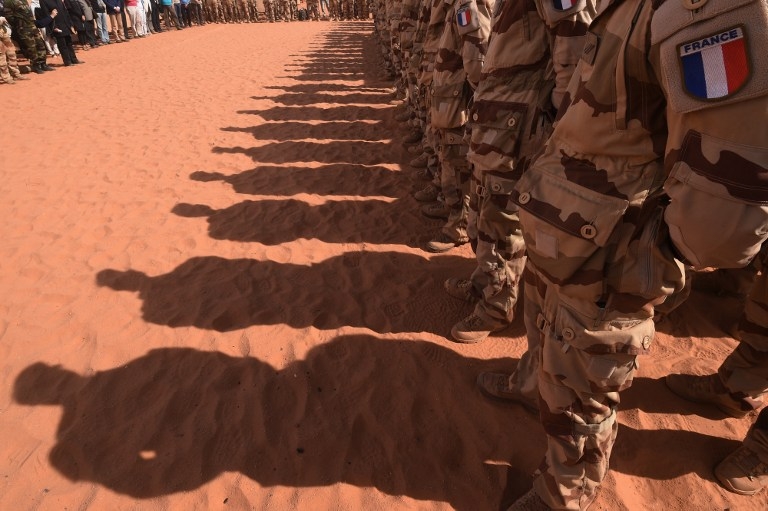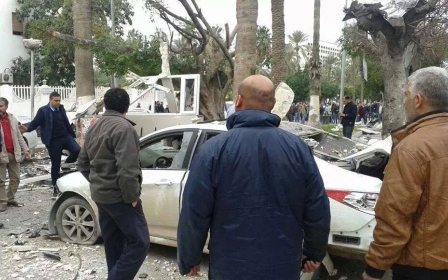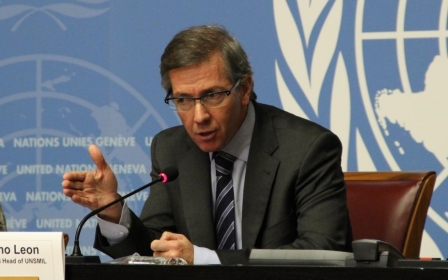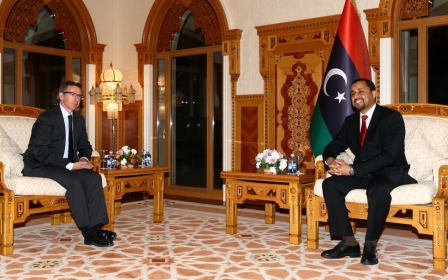Battle rages in Libya's southwest desert

GHAT, Libya - Hundreds of Tuareg families are camped at a squalid construction site in Ghat, a Saharan border town in south Libya near Algeria. Most have fled from Ubari, 250 kilometers to the east, where fighters laid siege to the town in September.
The battle in Ubari, near the Sharara oil field, Libya's second-largest, has pitted residents and their kin from the south's indigenous tribes, the Tuareg and Tebu, against each other. The fight is about who belongs there, and by extension, who controls oil fields and lucrative border routes.
Ibrahim, a 42-year-old former Tuareg soldier in the forces of former Libyan leader Muammar Gaddafi, rests on borrowed crutches outside a makeshift clinic at the construction site in Ghat. He was shot in the leg and his home was burnt down during the fighting in Ubari. Sitting next to him is Almina Mohammed, whose 13-year-old son Barka is recuperating from a stray bullet in his back. They are waiting for Ubari's violence to be over.
"There is no gasoline here, and so no town services," said Mohammed Sidi Regadi, a medical volunteer. He motions towards the children playing in sand outside the grim rows of cinderblock homes. There is no running water and the electricity supply is sporadic. Rotting food and plastic lie in piles nearby.
Ghat, a historic Tuareg settlement of around 25,000 people, is truly isolated. Algeria has closed its border crossing and ramped up security along its frontier since Libya's revolution in 2011. The Ghat airstrip is shut down. Snipers in Ubari block the one potholed road that links Ghat to the town and the rest of Libya.
Along this desert road in Libya's southwestern corner is also the turn-off to Niger; a path for illegal immigrants from sub-Saharan countries heading for Europe, smugglers moving weapons seized after Gaddafi's fall in 2011, and a suspected route for Islamic militants headed to battle in the northeast.
In the fight for assets and power across Libya, local conflicts are now either backed by the Tobruk-based "Dignity" government, largely recognised by Egypt, the United Arab Emirates and Western states, or "Libya Dawn" forces and their government in Tripoli, with key allies Turkey and Qatar.
"The problem is the political agenda," said Mohammed Senussi, a Tebu elder in nearby Murzuq, when his family was displaced with others from Ubari. "The Tuareg's goal is to control the oil field and the city."
Gaddafi manipulated and discriminated against the two tribes during his decades-long rule. The Tuareg, also based in neighboring Niger, Algeria and Mali, were often drafted into Gaddafi's security forces. The Tebu, with kin mostly in Chad, were marginalised, especially after Libya's loss of the disputed Aouzou Strip, now under Chad sovereignty, in the 1990s.
Drawn by the promise of full rights by Gaddafi during the revolution, Tuareg fighters largely lined up with the government, while the Tebu mostly sided with the rebellion.
'Turning a new page'
Libyan Dawn forces, spearheaded by revolutionary victors from the northern coastal city of Misrata, are now in the southwest to secure oil fields, the borders and enforce stability. They have forged an alliance with their adversaries, the Tuareg, at the expense of former allies, the Tebu.
"We are turning a new page with the Tuareg," Mohammed Al-Durat, a commander for Libya Dawn forces in the southern city of Sebha told Middle East Eye. "We made a promise not to touch them, but to help them."
On 5 November, Libyan Dawn forces backed a takeover of Sharara oil field by Tuareg fighters from its Tebu and Zintan guard. They now maintain a presence at the plant and an intelligence post at Germa, near Ubari.
A joint partnership between Libya and companies, including the Spanish-owned Repsol and French oil concern Total, Sharara is capable of producing 300,000 barrels of oil a day (bpd). The plant is now shut down, its pipeline sabotaged by the Zintan, who are battling Libyan Dawn forces in the northwest after losing Tripoli's airport to them last year. With facilities like the Al Sidra terminal also closed from fighting, Libya's oil production has dropped to around 320,000 to 350,000 bpd, from a 1.6 million bpd peak after the revolution.
Sheikh Jeli Ali is a Tuareg elder responsible for negotiating peace in Ubari. "The revolution made the Tebu bigger," he told Middle East Eye. "They come from another part of the country, and from Chad. They took control of the oil fields and told the French they were taking care of it."
Tuareg border guards, many of them former foot soldiers from Gaddafi's army, sit around a fire sipping tea, tasked with watching for smugglers ferrying sub-Saharan migrants, drugs and weapons. Their post is sandwiched between the scenic Akakus mountain range on one side and the long frontier with Algeria on the other. They are waiting to collect on a promise from the visiting Misratans to bolster their force with weapons, cars and radios.
Not all the Tuareg community agrees with the alliance. This week, the town's elders reportedly closed Ghat airstrip by laying rocks on the runway to deter Fajr Libya flying in military cargo.
Militant corridor?
Libya's southwest frontier, particularly the intersection with Algeria and Niger, is flagged as a corridor for Islamist militants affiliated to groups such as Ansar Al-Sharia and Al-Mourabitoun crossing over to join the battlefront between the Libya Dawn alliance and Dignity forces in Libya's northeast.
This month, French government troops based in Niger declared a crackdown on militants criss-crossing Libya's frontier. Backed by US surveillance drones, their military presence close to the border is exacerbating local tensions.
While the Tebu have repeatedly warned about an al-Qaeda presence in the south, many Tuareg accuse them of embellishing the truth for their own political gain.
"I don't think the French will enter Libya as it will be hard for them," said one Tuareg military leader, Edal Abu Baker Issa. "In my opinion, at that time what we call the 'jihad' will start."
Geoffrey Howard, an analyst with risk consultancy Control Risks, believes that for now the French and US are concerned with containing a spillover in Libya's violence. He is pessimistic that the ongoing UN peace talks will resolve Libya's local conflicts.
"Warring groups knew the red line, and damaging assets crossed that. Now the key strategic assets are highly vulnerable to the unrest," he said. "A negotiated settlement is not happening. Each side thinks that they can gain more from fighting."
New MEE newsletter: Jerusalem Dispatch
Sign up to get the latest insights and analysis on Israel-Palestine, alongside Turkey Unpacked and other MEE newsletters
Middle East Eye delivers independent and unrivalled coverage and analysis of the Middle East, North Africa and beyond. To learn more about republishing this content and the associated fees, please fill out this form. More about MEE can be found here.




